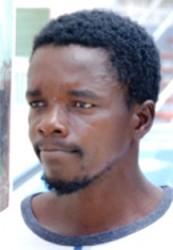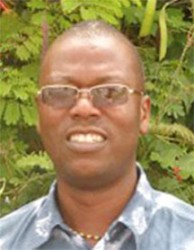A jury yesterday heard that Clive Knights had said in his caution statement that he had stabbed GTM executive Bert Whyte once on his arm after he was sexually assaulted by him.
Knights is currently on trial in the High Court before Justice Navindra Singh after being indicted for murdering Whyte on May 14, 2012.
According to the caution statement read by Lance Corporal Kester Cosbert, Knights had admitted to stabbing Whyte after he said he woke up to find the man sexually assaulting him. In the statement, Knights said that Whyte had once related that he was a homosexual and that he was desirous of being in a relationship with him.
However, Knights stated that he declined the offer but told Whyte that they could still be friends. The accused said in the statement that they had kept in contact even after they both left their respective jobs at the Georgetown Public Hospital Corpora-tion (GPHC).


The accused further related that on the night of May 14, 2012 he had agreed to have a few drinks with Whyte at a bar. He said that he fell asleep twice while at the bar because he was ‘high’ and tired. He stated that he recalled making his way to Whyte’s car but his memory of the events that followed was sketchy.
However, Knights told the Lance Corporal that he later felt someone sexually assaulting him and saw Whyte. Knights said that he made attempts to push the man off but he failed because Whyte was too strong. He said he managed to grab an ice pick and stabbed Whyte on his left arm.
He further said that after Whyte ran out of the car, he proceeded to drive the car to Berbice and changed the licence plate of the car while on the East Coast of Demerara.
Additionally, Knights had told investigators in the statement that he had driven Whyte’s car around Berbice a few times before the police stopped him. Lance Corporal Cosbert told the court that the statement was given freely and voluntarily and all police procedures were followed. Cosbert’s testimony was supported by Detective Constable Jason Kyte, the police officer who had signed the statement as a witness to it being taken.
Kyte had also testified to examining Whyte’s body and making the observation of the two stab wounds to the left side of the man’s chest. He further stated that he was present at both the post-mortem examination and cremation of Whyte.
Under cross-examination, both Cosbert and Kyte confirmed counsel’s statement that it is a criminal offence to rape or attempt to rape a person.
Government Forensic Pathologist Dr. Nehaul Singh was also present to read the results of the post- mortem examination. The doctor told the court that Whyte had died from haemorrhage and shock due to perforation of the heart and lungs as a result of the stab wounds he sustained.
However, he further stated that although Whyte had sustained the wounds to his chest, it would have taken the injured man between 30-60 minutes before he went into shock and died.
He went on to say that the wounds could have been caused by a sharp object, possibly an ice pick or a screw driver.
In response to questions posed by defence counsel Konyo Thompson, the Doctor indicated that bleeding would have occurred internally and that it would have been quite possible for Whyte to have walked a short distance before collapsing since the wounds were small in size.
Additionally, in res-ponse to a question posed by Justice Singh, Dr. Singh related that he had known both the accused and the deceased, the latter being a former personnel manager at the GPHC where he works.
Meanwhile, Phillip Dundas, the security guard on duty at Palm Court on the night of the incident related that he had seen Whyte sitting on a fire hydrant in front of the building on Main Street. He also told the court that Whyte had called out for somebody to take his cell phone and call an ambulance minutes before collapsing in front of the fire hydrant. The man further related that Whyte had to be lifted into a taxi which then took him to the hospital.
State attorney Judith Gildharie -Mursalin then closed the prosecution’s case.
A total of ten witnesses were called to testify at the trial.
The trial is expected to continue today with the defence presenting their closing arguments.




